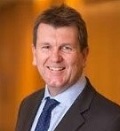Chris Austin CBE, Counsellor for Regional Development
 Chris Austin is a highly experienced civil servant working for the Department for International Development (DFID) with an extensive track record of leading large teams in the UK and overseas, and managing multi-million pound budgets.
Chris Austin is a highly experienced civil servant working for the Department for International Development (DFID) with an extensive track record of leading large teams in the UK and overseas, and managing multi-million pound budgets.
In early 2020, he was appointed as Counsellor for Regional Development in the British High Commission, Pretoria, where his role is to manage the UK’s development partnership relationship with South Africa, while also supporting heads of mission and country teams in the region.
Over his career, Chris has held a number of senior leadership roles including DFID Country Director in Bangladesh, Afghanistan and (briefly) Malawi, directing UK support for economic and social development, and he headed the UK Task Force relief effort for Hurricanes Irma and Maria in late 2017. He was also recently Deputy CEO leading the UK cross-governmental team responsible for designing and delivering the 2020 UK-Africa Investment Summit.
Alongside his roles within international development, Chris was Director of G8 Transparency for the G8 Summit in June 2013, directing cross-Whitehall policy and leading G8 senior official negotiations on transparency in the oil, gas and mining sector, land transactions and open data. He was also Head of EU Finances for the Treasury during negotiations on the EU Budget for 2007-13.
When did you first become attracted to a career in the public sector?
I'm not a finance professional, although a number of my jobs have involved overseeing either direct programme operations or major contributions to multilateral organisations - or negotiations about those. I was attracted to the idea of the public sector when I was an undergraduate studying world history. That got me interested in development issues, demographics, decolonisation and the post-colonial phase in the world economy. I thought it would be fascinating to work in government and be involved in what was happening.
My underlying passion is to work in areas where you're contributing to the public good. Public finance professionals do that, and my experiences on the International Accounting Education Standards Board reinforced that view of the profession working for the public good. I've derived a huge amount of professional satisfaction from the roles that I've had in different areas of government, both in the UK and overseas.
What have been the highlights of your career to date?
The Investment Summit role in early 2020 was certainly memorable. I got involved when the cross-Whitehall team was set up in February, 2019. We had a busy ten months planning and preparing, with several Ministerial changes, a new Prime Minister and a General Election during this period. The final few weeks were fairly intense with lots of details only nailed down at the last minute. But we delivered a high profile event for an international audience with both the Prime Minister and half the Cabinet involved. We received extremely positive media coverage. It was a great experience – a real rollercoaster at the end, but I think we achieved what we wanted to.
Two other memorable moments revolve around negotiations I've been involved with. One was the EU budget for 2007-2013, which was agreed in the UK's presidency council at the end of 2005. It is memorable for me because I spent about 16 hours fairly close to Tony Blair on the final day of of the negotiations. It was fascinating.
The third was in our G8 presidency year. I worked in the Cabinet Office as Director for Transparency and organised an event two days before our summit that was known as the three Ts – tax, trade and transparency. That was the start of commitments to registers of beneficial ownership.
The final one, from a development perspective, was having the idea to switch from funding individual projects with an NGO in Bangladesh called BRAC to having effectively a stake in BRAC's operations. By moving to a strategic partnership, we gave BRAC huge flexibility to deploy our funds and others much more effectively – a change that’s more than proved its value.
How has being a CIPFA member supported you in your career?
I took the CIPFA fast track programme with the University of Warwick Business School around 2006-2007. It offered a formal qualification in finance, which was then essential to work in senior roles in government, and a postgraduate diploma in leadership, which I later turned into an MSC in Public Management.
I found the Continuing Professional Development (CPD) sessions after I qualified were really helpful, as they helped sustain the informal network of public servants in central government who were working in finance or had some connections with finance, and kept us up to speed.
My own engagement with CIPFA shifted when it sponsored me to be a public member of the International Accounting Education Standards Board in 2011, and provided my technical adviser for the eight and a half years that I was on that board (including four years as chair).
What's the best piece of advice you've been given? And by whom?
It was from one of my history teachers at school who told the class just before our mock A levels “Nid yw'n ddiwedd y byd”which is Welsh for, "it's not the end of the world" – you must keep a sense of perspective. It has stuck with me for 40 years.